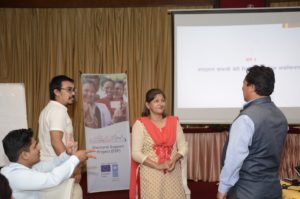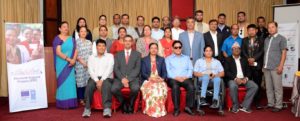“I want to be viewed as more than just a vote bank,” Kiran Shilpakar, President of National Association of Physical Disabled Nepal, says at the three-day BRIDGE workshop on disability rights and elections.
The BRIDGE workshop was organized by the Election Commission, Nepal (ECN) to increase the political participation and access of people with disabilities (PWD) on elections. In order to facilitate this, the workshop drew participants not only from among the PWDs, but also from other stakeholders such as representatives from the Ministry of Women, Children and Senior Citizen, disabled people’s organisations (DPO), disability rights advocacy groups, political parties and media. There were a total of 28 core participants and additional eight people were supporting some the core participants as their visual guides or interpreters. Out of the core participants, 18 were male and 10 female.
At the workshop, the Secretary of ECN, Dev Kumari Guragain informed the participants that the recommendations from the workshop would feed into the third five-year strategic plan of the Commission. The other speakers also emphasized that the workshop would serve as a platform to enhance dialogue and networking among the diverse groups of electoral stakeholders present.
The workshop was filled with enriching discussions on how to make the electoral cycle inclusive for PWDs. It discussed how the political parties will facilitate and encourage the political participation of PWDs. Some means identified were including captions under pictures in voter education curricula for the hard of hearing, making simple and easy-to-read voter education materials for those with intellectual disability, creating tactile voter education information and audio guides for the visually impaired and ensuring physical infrastructures are accessible and human support is in place. The workshop helped emphasize that there are variations even within and among PWDs which demand specific attention. In fact, the participants at the workshop represented seven different types of disabilities ranging from physical to intellectual disability.
Some of the participants representing the political parties committed to sharing the learning on disability rights and elections within their parties. Participants with disabilities committed to spreading information about the upcoming by-elections within their network and representatives of the media committed to ensuring they maintained an inclusive lens in their reporting. Therefore, steps toward a gradual attitudinal change were visible during the workshop.
The workshop was supported by the UNDP Electoral Support Project with backing from the European Union. It was organized from 13-15 September 2019 and proved to be an effective platform to bring out the voices of different electoral stakeholders for a coordinated approach. The participants attested to the effectiveness of the programme with a full hundred per cent of the respondents stating that the workshop had enhanced their capacity, a self-evaluation confirmed by pre- and post-workshop tests.
The Electoral Support Project- Phase II (ESP) is a technical assistance initiative which focuses on a long-term institutional and professional capacity development of the Election Commission Nepal (ECN) to conduct credible, inclusive and transparent elections. The objectives of the project are 1) to strengthen the capacity of the ECN to function as an independent and credible institution, 2) to allow the conduct of the election cycle in an effective, sustainable, and credible manner, and 3) to increase democratic participation, particularly for under-represented and disadvantaged segments of the Nepali society. The ESP is currently funded by the EU.


